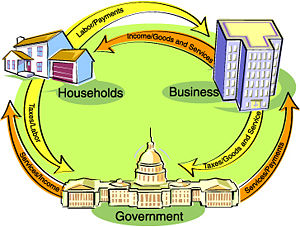I’m over it. Today both Noted Torture Apologist Tony Abbott (NTATA) and Kate Carnell invoked the productivity mantra. I know you didn’t ask but, “What is Productivity?”
It is ridiculously simple: It is the ratio between inputs and outputs. Now, unless you specify, it is actually meaningless because you can have Labour Productivity:
Note how our labour productivity continues to grow. This is important.
The confounding issue is Multifactor productivity. This is essentially similar but takes into account the other items that might effect inputs like capital. It is a much more complex formula:
Now learned Economists argue that multifactor productivity is a much better measure of an economy’s performance and who am I to say they are wrong. It does have a couple of problems though as I pointed out here. Not least of which is it is a trailing (or lagging) indicator. In most circumstances it can tell you about where an economy was at a point in the past but it is terrible as an indicator of upcoming trouble. In the example I link, Australia’s recent Multifactor productivity(MFP), the culprit is unprecedented mining investment that has not yet led to any output. Our MFP should go gang busters once all the new mining stuff kicks in.
So which one was NTATA referring to when he said:
Yes, we must boost productivity if we’re going to pay our way in the world successfully, but penalty rates are a matter for the Fair Work Commission and people are perfectly entitled to bring applications to the Fair Work Commission to ensure that their businesses are profitable and they can continue to maximise employment.
I think it’s obvious that he was referring to Labour productivity because he mentions wages and penalty rates but in his previous sentence he refers to investing in infrastructure. So the important take home is that it was gibberish. By leaving the door open to either he can retrospectively redefine his message. He used the mantra.
In fact he also used it as it’s clearest companion, the dog whistle. You just replace ‘Productivity’ with ‘Profit’ and the sentence makes perfect sense and you don’t have to worry about any of that complicated guff about MFP and whatnot.
So into the temple of mannon strides:
Some of you may remember Kate from such wacky pranks as the Canberra Hospital ‘Implosion’ that killed Katie Bender. It can be confidently stated that being the head of a peak body like the BCA, MCA and the ACCI is the business community’s equivalent of the dunce’s cap. Kate certainly has the qualifications and the track record to boot.
She is campaigning for the removal of penalty rates on the weekend and when it was pointed out to her that the only reason nurses work on weekends is because of the better pay. Her response?
Look, No it’s simply not the case.
Well that’s a fucking strong arguement Kate! The fingers in the ear school of management productivity. If you, like Kate, have a kindergarten understanding of productivty and business then cutting wages is the only way you can see to boost productivity (read profits) . My contention would be that if you can’t sell your product at a profit then you shouldn’t be in business.
In fact the main problem with productivity in Australia is bad managers and the lack of skilled employees. Neither of which lowering wages will alter. I just blew my chances at getting a gig with the ACCI didn’t I.





































